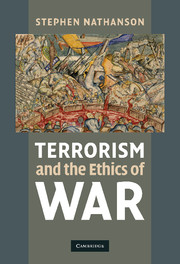Book contents
- Frontmatter
- Contents
- Acknowledgments
- Introduction
- PART I TERRORISM: WHAT'S IN A NAME?
- PART II WHY MORAL CONDEMNATIONS OF TERRORISM LACK CREDIBILITY
- Introduction: toward morally credible condemnations of terrorism
- 6 Why standard theories fail to condemn terrorism
- 7 Just war theory and the problem of collateral damage
- Conclusion: categorical vs. conditional criticisms of terrorism
- PART III DEFENDING NONCOMBATANT IMMUNITY
- PART IV HOW MUCH IMMUNITY SHOULD NONCOMBATANTS HAVE?
- Conclusion: terrorism and the ethics of war
- Bibliography
- Index
6 - Why standard theories fail to condemn terrorism
Published online by Cambridge University Press: 05 June 2012
- Frontmatter
- Contents
- Acknowledgments
- Introduction
- PART I TERRORISM: WHAT'S IN A NAME?
- PART II WHY MORAL CONDEMNATIONS OF TERRORISM LACK CREDIBILITY
- Introduction: toward morally credible condemnations of terrorism
- 6 Why standard theories fail to condemn terrorism
- 7 Just war theory and the problem of collateral damage
- Conclusion: categorical vs. conditional criticisms of terrorism
- PART III DEFENDING NONCOMBATANT IMMUNITY
- PART IV HOW MUCH IMMUNITY SHOULD NONCOMBATANTS HAVE?
- Conclusion: terrorism and the ethics of war
- Bibliography
- Index
Summary
Contrary to what we might expect, standard views about the ethics of war permit terrorist acts under some circumstances. People who accept these views face a difficult choice. They must either acknowledge that terrorist acts can sometimes be morally justified, or, if they want to condemn terrorism absolutely, they must reject whichever of these views they have held.
If we decide that terrorist acts can sometimes be morally justified, we would view terrorism in the way that most of us view war. Although war is brutal and destructive, most of us believe that it is sometimes morally right to engage in warfare. That is why we distinguish between just wars and unjust wars. We do not generally distinguish between just and unjust terrorism, however. But if there are permissible violations of noncombatant immunity, we will have to start making this distinction.
The history of warfare shows that the deliberate killing of innocent people has been hard to resist in practice. I have already mentioned the “terror bombings” of World War II, but there are many other cases. In a recent study of “civilian victimization” in war, Alexander Downes examined 100 wars involving 323 countries between 1816 and 2003. Of the 175 countries that had the option of attacking civilians, almost a third, 52 countries, chose to do so. According to Downes, whether countries choose to attack civilians depends on the type of war being fought and the requirements for victory.
- Type
- Chapter
- Information
- Terrorism and the Ethics of War , pp. 79 - 93Publisher: Cambridge University PressPrint publication year: 2010



